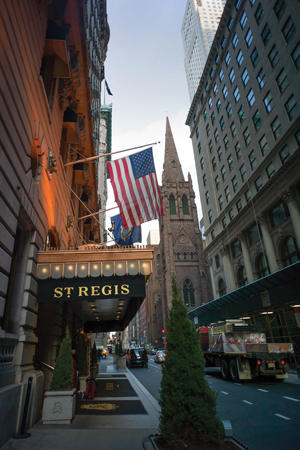The retail apocalypse delivered a one-two punch to Vornado Realty Trust last year when a pair of its largest retail tenants filed for bankruptcy.
The first came in May 2019, when British apparel company Topshop announced it was closing all of its U.S. stores, including two locations, on Fifth Avenue in Midtown and Broadway in Soho, owned by Steven Roth’s publicly traded real estate behemoth.
The second blow came four months later in September 2019, when fast-fashion stalwart Forever 21 filed for bankruptcy. The trendy retailer is one of Vornado’s largest retail tenants with stores near Union Square, at the Crossroads of the World in Times Square and on Seventh Avenue near Penn Station.
For the Crossroads of the World and Seventh Avenue stores, Vornado agreed to slash Forever 21’s annual rent of $20 million by more than half — a bitter pill to swallow for one of the city’s largest retail landlords.
Making matters worse, leather goods retailer Coach closed its 6,000-square foot flagship at Vornado’s 595 Madison Avenue, where it had been for 30 years, leaving the entire retail portion of the building vacant.
The task of dealing with those challenges — along with the momentous new pressure the coronavirus pandemic is placing on the entire retail sector — now falls on the shoulders of Vornado’s new head of retail, industry veteran Haim Chera.
Chera joined the real estate investment trust last April as part of a $5.6 billion joint venture Vornado struck with Chera’s family firm, Crown Acquisitions, on a portfolio of retail properties in Times Square and along Fifth Avenue.
Chera, who is in his late 40s, now works as an executive vice president at Vornado alongside six others as part of the company’s executive management team. He is tasked with running a portfolio that spans 2.7 million square feet, including the retail at the base of the St. Regis New York hotel on Fifth Avenue, the Penn Station area and two full blocks in the heart of Times Square, and redeveloping a significant portion of it.

At the same time, Vornado — which has a total portfolio of more than 27 million square feet around the U.S. and a market cap of about $5.7 billion as of late March — is taking on a massive overhaul of its properties in the Penn Station area. That tall order includes taking rent-paying retailers out of service in the bowels of the station to make way for construction and transforming the rear section of the massive Farley Post Office into the office and retail portion of the Moynihan Train Hall project.
Meanwhile, it’s been roughly a decade since Vornado has had a retail head. Sandeep Mathrani left the company in 2010 to helm the mall REIT General Growth Properties, which was later acquired by Brookfield Property Partners — Mathrani parted ways with Brookfield less than two years after that to lead WeWork.
Now, Chera has his work cut out for him as he steps into his new role at a time of profound uncertainty for the retail market.
Chera and a Vornado spokesperson declined to comment for this story.
Danny Ismail, an analyst at Green Street Advisors, said Vornado’s street retail portfolio is pretty buttoned up with most of it leased. He said the biggest question is which retailers will close up shop like Coach and Topshop.
“The biggest known unknown is which retailer is planning on closing their high street locations,” he said. “That’s definitely a risk but one that’s hard to predict.”
Rocky retail
“Negative surprises” is how Vornado president Michael Franco described the news of Topshop and Forever 21 filing for bankruptcy on the REIT’s October earnings call. And with some of the priciest retail in Manhattan under its belt at a time when most retailers have been forced to shut their doors, Vornado has to be prepared for more of them.
The company owns several buildings in some of Manhattan’s prime shopping areas like Upper Fifth Avenue, Madison Avenue’s Gold Coast, Times Square and Soho — commercial corridors that have already been hardest hit by the retail slump, and are now virtual wastelands under the state’s mandatory lockdown.

St. Regis New York hotel
The Times Square bowtie had the highest availability rate of all the major shopping districts in the borough, at more than 31 percent in the third quarter of last year, according to Cushman & Wakefield. Madison Avenue’s Gold Coast from East 57th to East 72nd streets was second at about 29 percent, followed by Upper Fifth Avenue from 49th to 60th streets at just under 28 percent.
Vornado has some major vacancies it needs to deal with, including the base of 689 Fifth Avenue at the corner of 54th Street, where Massimo Dutti shut its doors, and 759-771 Madison Avenue off of 66th Street, which according to Vornado’s most recent annual report was a third vacant.
So, Vornado’s deal to sell off a big portion of its retail can be seen as the company stepping away from the troubled market to focus more on the booming office sector.
“Clearly they’ve been trying to de-emphasize the street retail portion and monetized it,” said Piper Sandler analyst Alex Goldfarb, who covers Vornado and its REIT competitors.
“I think like anyone else, they’re viewing where money is best spent,” Goldfarb said. “Right now, you’re seeing creative office rents that are easily into $100 [per square foot]. There’s a lot of demand for creative office and modern office right now. You’re not seeing the same demand on the retail front.”
Vornado raised eyebrows in April 2019 when it announced it sold a 45.4 percent equity interest in seven properties on Upper Fifth Avenue and Times Square to Crown and its partner, the Qatar Investment Authority. Crown and Vornado had already been partners on the portfolio, and one source with knowledge of the deal said it was Chera who spearheaded the talks that brought the two companies together.
The portfolio includes five properties on Fifth Avenue grouped together between 51st and 55th Streets, including the retail at the base of 666 Fifth Avenue — where Chera played a significant role in putting together a blockbuster deal.
Soon after Kushner Companies purchased 666 Fifth for a record $1.8 billion in 2007, the company struck a deal to sell the retail portion the following year to Crown and its partner, private equity giant the Carlyle Group, for $525 million.
To make the deal work, sources said, Chera was instrumental in negotiating buyouts with tenants and bringing in the Japanese apparel retailer Uniqlo to sign a 15-year lease worth $300 million — one of the city’s most expensive retail leases ever.

Kushner Companies founder Charlie Kushner told The Real Deal Chera is one of a few dealmakers who could have put the whole thing together.
“The deal that he did at 666 was due to his skilled negotiation and ability to position tenants in a way that others could not accomplish,” Kushner said.
Street cred
Chera is highly regarded among his colleagues and seen as a seasoned leader among the rarefied group of people who operate in the upper echelons of New York’s pricy world of retail real estate, including fellow Syrian Jewish investors Joe Sitt and Jeff Sutton.
“I think there’s only a handful of people out there who have earned the credibility of retailers to do the kind of business he does, and he’s one of them,” said Dean Shapiro of the Canadian investment giant Oxford Properties Group, which has acquired three properties with Crown including the $1 billion Olympic Tower on Fifth Avenue across from Rockefeller Center.
Of course, working at a large public company with investors to answer to is a much different environment than working for the family firm. But people familiar with the joint venture said Chera actively sought out the tie up with Vornado and a role within the company’s ranks.
Known by his friends in the industry as “Haimey,” the middle brother to Isaac and Richard Chera, comes from a family with deep roots in New York City retail.
Their grandfather, Isaac Chera, founded a department store called Young World in Brooklyn in 1947, and started building the family’s real estate empire by buying the properties that housed the stores as he expanded the chain. Their father, Stanley Chera, who the New York Post reported was hospitalized in late March with an unknown illness, founded Crown Acquisitions in the 1980s and cemented the Cheras as one of the prominent Syrian Jewish families that made the transition from retailers to owners.
Haim Chera got his start in the business working at Young World, which gave him valuable insight into the retailer side of the business, according to those who know him.
People who have interacted with Chera during his brief time at Vornado said he will sometimes sit in on leasing meetings when a tenant wants a higher-up on the landlord side present. Others said he largely works side by side with company president Franco on bigger-picture strategy that goes beyond retail and focuses on driving up Vornado’s stock price.
The company, like other real estate investment trusts, is taking it on the chin from Wall Street investors who price the stock at a discount to the value of the firm’s properties.
Vornado’s biggest opportunity to create value, observers said, is the Penn Station area, where Gov. Andrew Cuomo has announced plans to combine several buildings in the area into a 4 million-square-foot megacomplex, which observers say would likely be a boon to Vornado.
Michael Lewis, an analyst at SunTrust Robinson Humphrey, said the bar for Vornado’s success in street retail is relatively low.
“I don’t think anybody’s looking for the company to hit a home run in street retail. I think investors would be pleased just to see things flatten out or improve at all from here,” he said. “I think people certainly look at it are more considering the risks than the opportunities at this point.”
